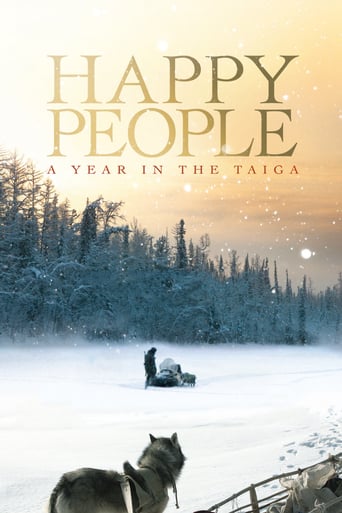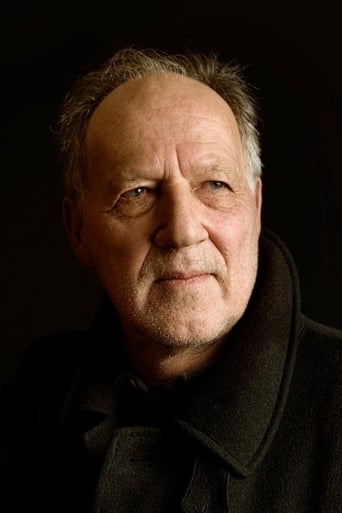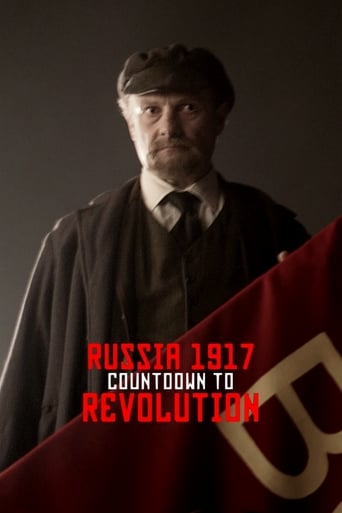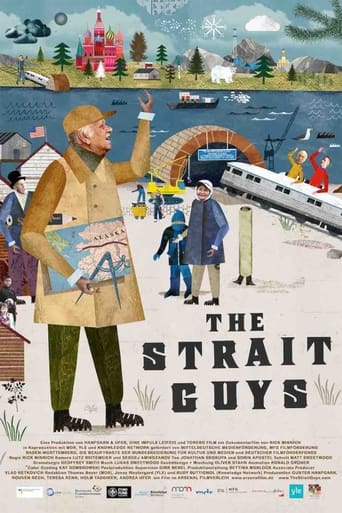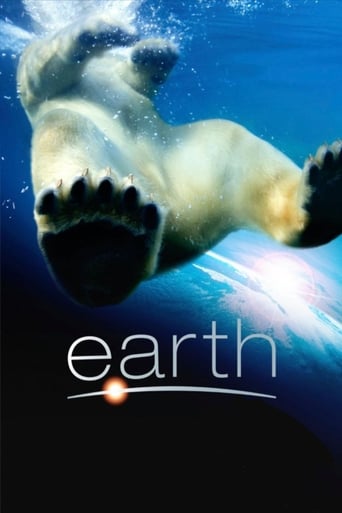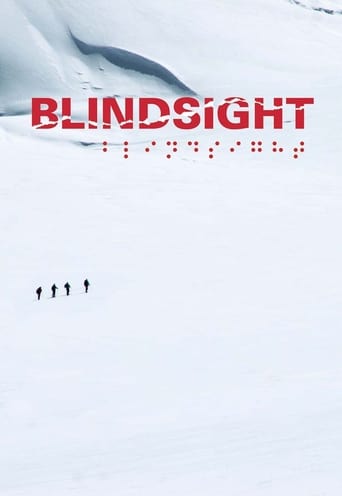Happy People: A Year in the Taiga (2010)
In the center of the story is the life of the indigenous people of the village Bakhtia at the river Yenisei in the Siberian Taiga. The camera follows the protagonists in the village over a period of a year. The natives, whose daily routines have barely changed over the last centuries, keep living their lives according to their own cultural traditions.
Watch Trailer
Cast


Similar titles
Reviews
This is billed as a year in the life of a small village in the Taiga, where the indigenous people live happily (and sustainably) as they have for 100s if not 1000s of years. I call BS. This is not the life of a village. This is the life of a handful of men who work for the cash (outside) economy by trapping fur meant for export to big cities. They are, apparently, men who were sent there by the Communist government 40 years ago who have managed to survive by subjugating the local indigenous and by treating their dogs like crap. There are few women or children shown and no other townspeople. This is Werner Herzog's romantic paean to the Paleo white male hunter-trapper culture. They are not indigenous, they are not representative of the village, they are not even, as far as I could tell, happy (unless morose philosophizing in Russian can be considered happiness). WTF??? I knew Werner was a romantic, but I didn't know he was so trapped in his imagination. This movie is ridiculous.
I have recently seen my first 2 Werner Herzog documentaries, Into the Abyss and Grizzly Man and I loved both of them and so came to Happy People with high hopes. It was a bit of a let-down.Firstly, most people seem to give Herzog all the credit here yet he did not go out to Siberia to film any of his 'own' documentary. Whilst he shares directorial credit, Dmitry Vasyukov did all the beautiful camera-work and put in the hard days living in those conditions, so he must get the lion's share of the plaudits. Secondly, the film purports to be aboutthe lives of the villagers yet the vast majority of the film concerns one trapper. The film follows him and his dogs around as he goes about his life hunting animals in the wild. We learn next to nothing about the lives of the women or children in the village, and there are only sporadic moments featuring other menfolk. It felt as if the film was about this one hunter and the rest of the people in it were just context for his life. Thirdly, where are the 'happy people' the title refers to? I didn't see any particularly happy people in the film. I think the principle behind the film was to give the impression that people who lead simpler, remote lives are happier than the rest of us, but i saw no evidence of this whatsoever. The men who were shown collecting logs, who referred to their universal alcohol problems, looked particularly UNhappy. These people lead very difficult lives in extreme conditions. I'm not saying they were going around looking miserable, but they certainly weren't jumping for joy at their wonderful lives. It seems a bizarre title for the film. Finally, I like to learn from documentaries but I also like to be entertained and I found this film just a bit boring. This is not to say there are no good points ... there are scores of beautiful nature shots and it is an interesting look into a completely different way of life. That was not enough for me to make it a recommendation.
Werner Herzog's "Happy People: A Year in the Taiga" is comprised of footage shot for another documentary by Russian director Dmitry Vasykov. Vasykov's film, roughly four hours long, detailed the lives of trappers living in the Siberian wilderness. Impressed with Vasykov's material, Herzog reassembled the footage, added his own structure and voice over narration. "We are all killers and accomplices," one trapper says, "even those who are kind hearted." The rest of the film crawls its way through material familiar to Herzog fans. We watch as tiny men struggle to survive in the wild and struggle to stay sane amidst a Nature which threatens to suffocate. Herzog's trappers spend much of their time alone, at war and stuck in an ongoing cycle in which they fight the elements. Each potion of the year seems spent preparing for the next.There are some moments of humour, like one scene in which a ridiculous politician visits the Taiga, but for the most part Herzog's customary absurdity is absent. Likewise, though there are some sublime sequences (night time shots of a snow-capped village, for example), the majority of the film lacks Herzog's unique eye. This is understandable, as Herzog shot no footage himself. Some have found Herzog's portrayal of the Siberian wilderness to be cosy and romantic, but this is to misread the film. The "Happy People" of Herzog's title is partially ironic, his film focusing on a kind of tired drudgery. Locals are alcoholics, there is no paid work, men are separated from their families and the trappers live solitary lives seemingly torn from the Myth of Sisyphus. Perhaps only Western eyes can romanticise what Herzog shows here; his characters show no signs of pursing material possessions, are far removed from all pop culture trappings and are busy clinging to skills and traditions which seem on the verge of being lost to time. To some, this conveys a very specific form of nostalgia. On another level, though, the film's title is very sincere. These trappers are men locked in a kind of Herzogian "natural state", free from modern neuroses, modern wants, manufactured desires and content with the fruits of their labour, their living conditions and their lots in life. They don't moan, but knuckle down and get on with things. Herzog challenges our notions of contentment and happiness on one hand, whilst also deglamorising a kind of fashionable survivalism on the other.7.9/10 – One of Herzog's more conventional documentaries. Incidentally, the film features a relative of famed Russian director, Andrei Tarkovsky. Worth one viewing.
Werner Herzog once again tackles the man against nature theme, as he did with Grizzly Man previously. In that feature, he followed a guy living happily amongst a group of bears, until a very unfortunate ending. This time, he ventures to Siberia to tell the story of sable trappers battling the freezing cold and other elements in the frozen tundra of the Soviet Union. The scenery is spectacular, and the day to day lives of the inhabitants interesting to see from a modern western perspective. I love the Huskies, who accompany the hunters during the brutal conditions with seeming content. As for the humans, they seem to be satisfied with their physically demanding but rewarding lifestyles. Herzog narrates, as usual, with an attitude of respect for his subjects. He spends the ninety minutes sticking to the visual beauty of the wilderness from overhead to underwater shots below the frozen river. An interesting documentary.

